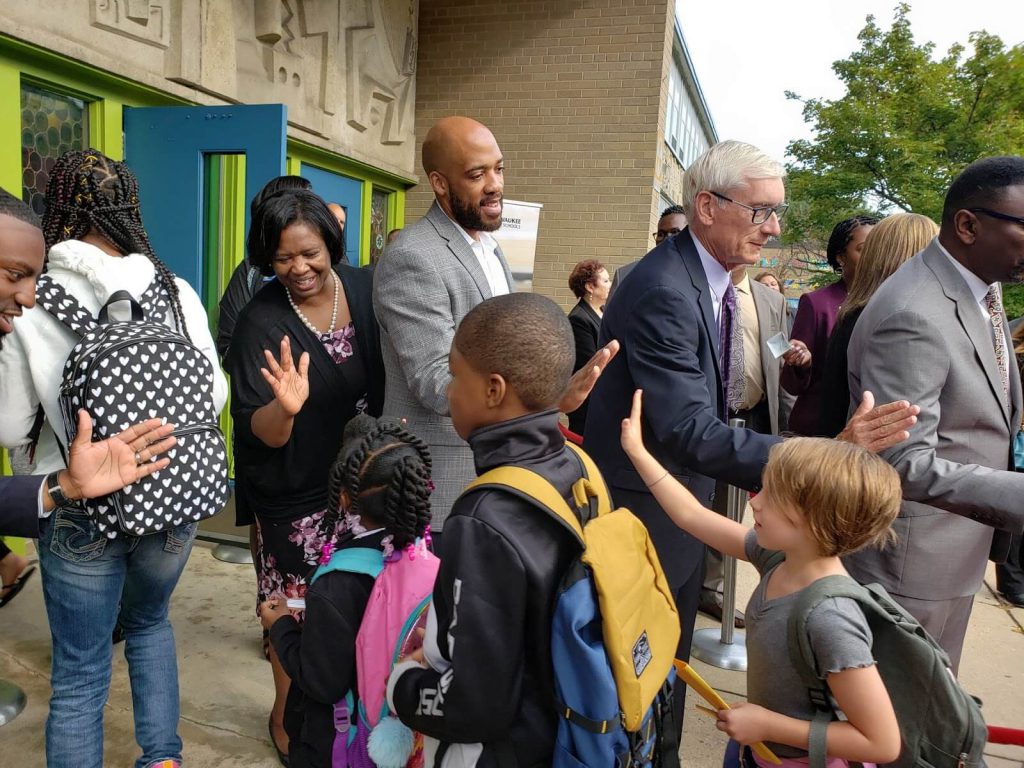Evers Wants Massive Education Investment
Biggest item in schools budget: $140 million increase in early childhood education.

Back to School welcome 2019 with Carolyn Stanford Taylor, Mandela Barnes and Tony Evers. File photo from the of Office of Gov. Evers.
“If we’re going to bounce back from this pandemic, then we have to start by making sure our kids are better off than when we started this pandemic,” Gov. Tony Evers told an online audience at his biennial budget address on Tuesday. The governor touched on key issues for public education advocates, including broadband access, early childhood education, racial equity, the school-to-prison pipeline and special education.
As part of an overall $7.7 billion two-year education budget, Evers is proposing a $140 million investment in early childhood education. “Every kid in our state should have access to high-quality, public education. Period. But it has to start early — we know the first few years of our kids’ lives help define their future,” he said. “And for many Wisconsin families, quality childcare is something that isn’t available or affordable.”
Daithi Wolfe, an early childhood policy analyst at Kids Forward, says he is thrilled that Evers is prioritizing early childhood education. “The main gist of this is that for years and years, Wisconsin relied on federal funding to do anything at all for early childhood education,” Wolfe says. And while Evers’ $140 million proposal includes federal funds, Wolfe says, “this $106 million in state funding is a huge win all around because we feel like we’ve been begging for that for a decade or more.”
First Lady Kathy Evers — who met Evers when they were in kindergarten in Plymouth, Wisconsin — has made early childhood education a key priority, Wolfe says, adding that “the pandemic exposes the fact that the system is frail and underfunded, and that COVID is affecting people of color and low-income people more.”
Boost for special education
In his address, Evers pointed out that his last budget provided a $95 million increase in special education funding, the first increase in a decade. But the governor is upping that amount in this budget by requesting $709 million.
Joanne Juhnke, advocacy specialist for special education at Disability Rights Wisconsin, calls the increase “encouraging.”
“Students with disabilities are students first and foremost, and when Wisconsin gets proper funding in place for special education, our districts gain the flexibility they need to fully support students without disabilities as well,” says Juhnke. “Between special education categorical aid and high cost special education aid, the investment that Gov. Evers proposes is welcome and overdue. And after the challenges of this pandemic year, many of our students are deeply in need of the assistance that the increases in student services aid and school-based mental health services would provide.”
Evers also announced a $20 million package designed to assist rural schools and vowed to spend more money on schools than prisons, saying, “The Badger Bounceback Agenda is about investing in people, not prisons.”
‘Just get it done’
In a pointed section on seeking Legislative support for his budget proposals, Evers criticized Republicans for stalling essential funding for schools. “For the second budget in a row, our Badger Bounceback agenda proposes that this state delivers on its commitment to two-thirds funding for our schools,” Evers said, adding that a Republican-led bipartisan commission, the Blue Ribbon Commission on School Funding, came out in favor of lifting revenue caps, which have been frozen since the 2014-15 school year, to allow districts to fund schools through property taxes.
Two-thirds funding, says Evers, “should’ve been passed in our last budget or in the special session of the Legislature I called last year. Unfortunately, the Legislature couldn’t get it done in either case. Well, here’s the bottom line: If members of the Legislature are going to make promises on this, then they sure ought to keep them. Let’s stop talking about it and just get it done.”
Angelina Cruz, president of Racine Educators United, says Evers’ budget is what is needed for Wisconsin to recover from the pandemic. “Embracing equity in school funding, caring for the most vulnerable among us, and demonstrating respect for workers by establishing collective bargaining rights will advance all Wisconsinites to a better place,” she tells Wisconsin Examiner.
Heather DuBois Bourenane, executive director of the Wisconsin Public Education Network (WPEN) says her first reaction to Evers’ budget is, “It’s about time.”
“This budget invests in education to create a path to closing gaps and opening doors, and it’s what people have been begging for,” she says. “The two-thirds funding benchmark that both parties want is not only affordable, but necessary.”
She says “it’s huge” that the governor is also proposing per-pupil additions to state aid formulas for English language learners and low-income students. ”Finally, we have a budget where spendable dollars will get into every classroom. It’s a budget that makes sure the money goes where it’s needed most and gives our districts the flexibility and stability to spend the dollars where they need it most.”
The caveat, of course, is that Evers now has to contend with a GOP-controlled Legislature that appears ready to block his proposals. “The Republican response to the address signals a lot of resistance,” says Bourenane. “I would strongly encourage everyone who sees something good in this budget to be a part of the budgeting process in the coming weeks and months.”
“It’s great to have something we can cheer for,” she continues. “If this budget was passed, our schools could prepare to open in the fall in a way that they haven’t had the luxury to in the past 20 years.”
Reprinted with permission of Wisconsin Examiner.




















